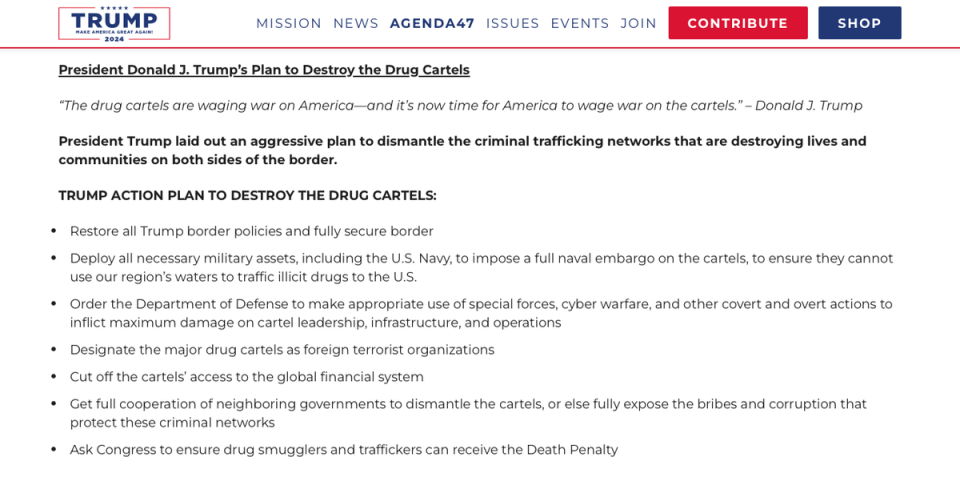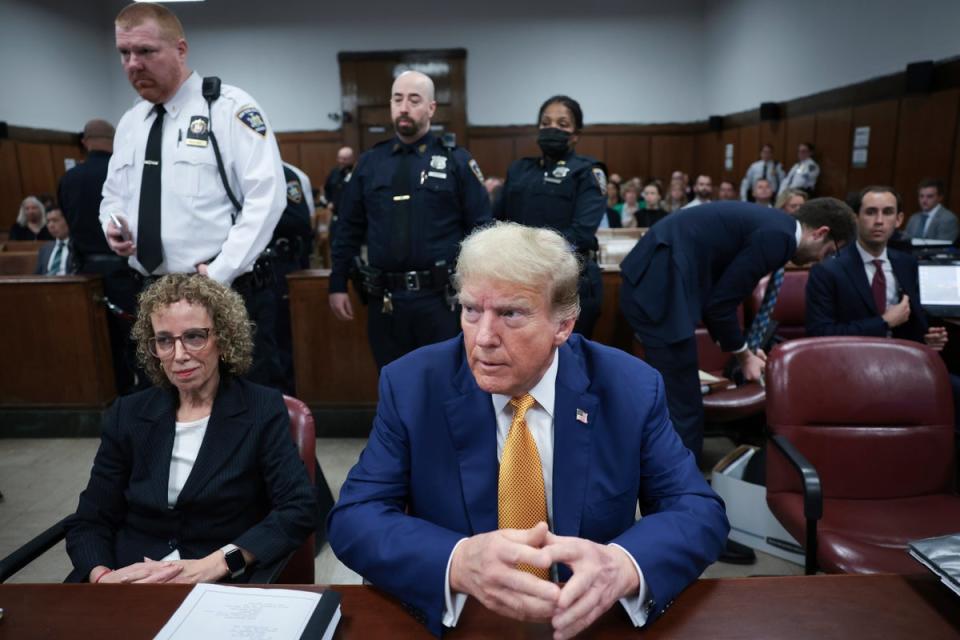Trump ‘considers plan to send hit squads to Mexico to kill cartel leaders’
Presumptive Republican presidential nominee Donald Trump is privately considering a plan to deploy American assassination squads to Mexico to take out drug cartel leaders if he is re-elected in November, according to a report.
Three sources familiar with the former president’s proposal told Rolling Stone that he has insisted that the American military has “tougher killers than they do” and is mulling a similar plot to that carried out when US forces killed ISIS leader Abu Bakr al-Baghdadi back in 2019.
The deployment would be covert, the outlet reported, and would not rely on the Mexican government’s consent.
Just earlier this year, one source recalled the former president saying that the US government should create a “kill list of drug lords,” consisting of the most notorious heads of drug cartels that a special-ops team would be tasked with killing or capturing, Rolling Stone reported.
Rolling Stone’s report expands upon Mr Trump’s 2024 policy proposals, dubbed “Agenda47”.
That proposal includes an “action plan to destroy the drug cartels” in the form of a bulleted list.
One bullet states that Mr Trump would order the US Department of Defense “to make appropriate use of special forces, cyber warfare, and other covert and overt actions to inflict maximum damage on cartel leadership, infrastructure, and operations.”
Mr Trump’s campaign website also says his administration would make it the “official policy” of the US to “take down the drug cartels just as we took down ISIS.”
The former president also said in a campaign video about this agenda item: “Either we will get the full cooperation of other governments to stop this menace—or we will expose every bribe, every kickback, every payoff, and every bit of corruption that is allowing the cartels to preserve their brutal reign.”
However on Wednesday, a Trump spokesperson said in an email: “If you read the Agenda47 proposals, no where does it say what is being alleged in Rolling Stone.”

This isn’t the first time that Mr Trump has discussed his plans for tackling Mexico’s gang violence.
In 2017, then-president Trump told then-Mexican President Enrique Peña Nieto in a phone call that he was prepared to send US troops to stop “bad hombres down there,” The Associated Press reported at the time. “You aren’t doing enough to stop them. I think your military is scared. Our military isn’t, so I just might send them down to take care of it.”
In 2020, Mr Trump also asked his then-Defense Secretary Mark Esper if it would be possible for the US to launch missiles into Mexico to “destroy the drug labs” and demolish the cartels — and keep the US’s involvement a secret, according to Mr Esper’s memoir A Sacred Oath.
Although Mr Trump’s plans to take out Mexico’s cartels have been discussed in private, Mr Trump has made his thoughts about Mexico — and the country’s citizens — very clear in public.

While running for the White House in 2015, Mr Trump accused Mexico of “not sending their best” to the US.
“They’re bringing drugs. They’re bringing crime. They’re rapists. And some, I assume, are good people,” he said.
During his administration, Mr Trump also ordered the building of a border wall along the US-Mexico border.
Now, as he campaigns for the White House again, the former president’s anti-immigrant rhetoric continues to ramp up.
At an Iowa rally in September, he told supporters that, if he wins the 2024 election, he will use “all resources needed to stop the invasion” at the US-Mexico border, “including moving thousands of troops currently stationed overseas”.
Mr Trump has also been accused of echoing Nazi rhetoric by saying that migrants are “poisoning the blood” of the country, referring to migrants as “animals,” and suggesting that some migrants are “not people”.
Immigration is shaping up to be a major issue in the 2024 presidential election, with Mr Trump and Republicans hitting out at President Joe Biden over his handling of the US-Mexico border. In March 2024, there were nearly 190,000 encounters at the US southern border.
This article was updated following publication to include the Trump campaign’s response.


